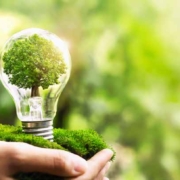Conserve and Conserve Some More

By Dave Trecker
The doomsday scenarios persist. We hear the planet is burning up, the glaciers are melting, the sea is rising, wildfires are raging, drought is everywhere. Climate change is upon us.
What can we do? The climate warriors want us to stop using fossil fuels (won’t happen), convert to electric vehicles (sales are tanking) and bring on solar and wind (slow and inadequate). More nuclear power and even carbon capture are considered acceptable (but many years away).
What is seldom mentioned is the one sure thing. We can do it now; it costs little, and it always works.
What is this magic elixir? Simple conservation. If you use less energy, you need to produce less energy. Producing less energy means a reduction in greenhouse gasses and a slowing of climate change.
There’s nothing sexy about conservation. It has no pizazz. Politicians get no attaboys. Everyday folks can do it.
We’re talking about adding insulation, turning off lights when you leave a room, setting AC temperatures a few degrees higher, carpooling, installing multi-pane windows and making wider use of heat pumps.
Local energy expert Jim Rogers says, “Maximizing conservation would save more energy per dollar spent than all the energy solar projects produce.”
Here’s a partial list of conservation measures• Take showers of 5 minutes or less.
- Use cool water when washing clothes.
- Keep blinds on east-facing windows closed in the morning.
- Use LED instead of incandescent bulbs.
- Insulate attic space.
- Clean and frequently replace air filters.
- Get a home energy audit for expert advice on further savings.
The U.S. Department of Energy recommends raising your AC thermostat by at least 7 degrees when you’re away for an extended period of time.
None of this is rocket science. Yet the EPA estimates homeowners can cut energy usage by up to 25% by taking such common-sense steps.
Local officials are pitching in. Miami-Dade just announced itis outfitting 1,700 public housing units with new low-energy airconditioners.
Europeans are also starting to conserve. Germans, noted for their frugality, are reportedly reducing heating in the winter, doing laundry less often and with fuller loads, even paring back the lighting in their beloved Christmas markets.
The French, seeking “energy sobriety,” are switching off streetlights at night and shutting down idle electrical equipment. Parisians have even taken to dimming lights on the Eiffel Tower.
How important is conservation? The Department of Energy says a whopping 40% of U.S. energy consumption is in buildings, commercial and residential– mostly for heating, cooling and lighting. Make an impact there, and you’ll impact climate change.
As is often the case, research is showing the way. Here are someexamples.
Cork-like insulation materials and new exterior walls that shift between heat-absorbing solids on cold days and heat-emitting liquids on hot ones are under development.
The latest push is on rooftop coatings, paints that reduce solar heat gain. Chemical & Engineering News reports that dialing inparticle size on barium sulfate or calcium carbonate pigments maximizes light scattering and reflects 98% of solar radiation. That can yield up to 20% energy savings in most buildings.
Paint researchers are pushing conservation even further. Soon to be available are coatings with thermochromic pigments that change from reflective white on hot days to absorbing purple when the weather turns cold.
One startup company is customizing paints for maximal effectiveness in each of the seven U.S. climate zones.
These are early days, but the progress so far has been impressive. And there’s an important side benefit to conservation. In addition to slowing climate change, the homeowner can also save as lug of money on electric bills. My wife takes credit for that every month.
Dr. Trecker is a chemist and retired Pfizer executive living in Naples.




Leave a Reply
Want to join the discussion?Feel free to contribute!